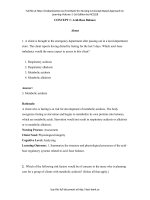Ancient philosophy a new history of western philosophy volume 1 (new history of western philosophy) ( PDFDrive ) 109
Bạn đang xem bản rút gọn của tài liệu. Xem và tải ngay bản đầy đủ của tài liệu tại đây (22.4 KB, 1 trang )
ARISTOTLE TO AUGUSTINE
could achieve the same purpose there would be no need for slavery. ‘If
every instrument could achieve its own work, obeying or anticipating the
will of others, like the statues of Daedalus . . . if the shuttle could weave and
the plectrum pluck the lyre in a similar manner, overseers would not need
servants, nor masters slaves’ (1. 4. 1253b35–54a1). So perhaps, in an age of
automation, Aristotle would no longer defend slavery.
Though not himself an aristocrat, Aristotle had an aristocratic disdain
for commerce. Our possessions, he says, have two uses, proper and improper. The proper use of a shoe, for instance, is to wear it: to exchange it
for other goods or for money is an improper use (1. 9. 1257a9–10). There is
nothing wrong with basic barter for necessities, but there is nothing
natural about trade in luxuries, as there is in farming. In the operation of
retail trade money plays an important part, and money too has a proper
and an improper use.
The most hated sort of wealth-getting is usury, which makes a proWt out of money
itself, rather than from its natural purpose, for money was intended to be used for
exchange, not to increase at interest. It got the name ‘interest’ (tokos), which means
the birth of money from money, because an oVspring resembles its parent. For this
reason, of all the modes of getting wealth this is the most unnatural. (1. 10. 1258b5–7)
Aristotle’s hierarchical preference places farmers at the top, bankers at the
bottom, with merchants in between. His attitude to usury was one source
of the prohibition, throughout medieval Christendom, of the charging of
interest even at a modest rate. ‘When did friendship’, Antonio asks Shylock
in The Merchant of Venice, ‘take a breed for barren metal of his friend?’
One of the most striking features of Aristotle’s Politics is the almost total
absence of any mention of Alexander or Macedon. Like a modern member
of Amnesty International, Aristotle comments on the rights and wrongs of
every country but his own. His own ideal state is described as having no
more than a hundred thousand citizens, small enough for them all
to know one another and to take their share in judicial and political
oYce. It is very diVerent from Alexander’s empire. When Aristotle says
that monarchy is the best constitution if a community contains a person or
family of outstanding excellence, there is a pointed absence of reference to
the royal family of Macedon.
Indeed, during the years of the Lyceum, relations between the worldconqueror and his former tutor seem to have cooled. Alexander became
86









